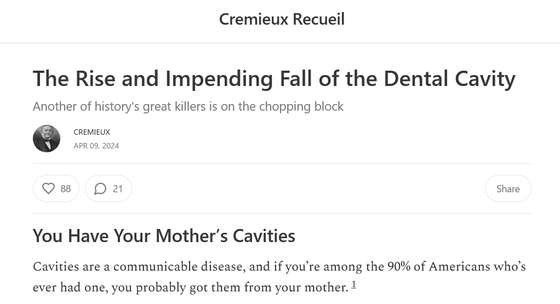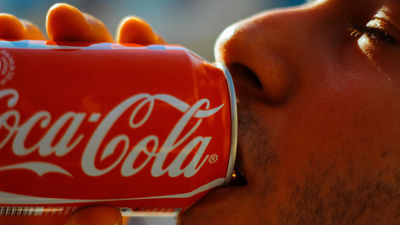Humans may finally be able to overcome tooth decay, which has existed for 54 million years

Humans only grow teeth once in their lifetime, and once they are lost, it is almost impossible to get them back. In order to prevent tooth decay, it is necessary to brush your teeth diligently and carefully, but in recent years, a new method of preventing tooth decay has been developed, as introduced by Cremieux Recueil, a newsletter that introduces various research.
The Rise and Impending Fall of the Dental Cavity

Tooth decay is an infectious disease that is said to be transmitted primarily from mother to child. Streptococcus mutans, the main cause of tooth decay, prefers carbohydrates and produces lactic acid as a metabolic product. This lactic acid demineralizes tooth enamel, causing tooth decay.
The oldest record of tooth decay is found in the fossils of primitive primates dating back 54 million years. The percentage of cavities found was 7.5%, and there was a tendency for tooth decay to increase during periods when fruit consumption was high. On the other hand, there were no traces of tooth decay in dinosaur teeth, which is thought to be because fruit was not eaten much and because the enamel of dinosaur teeth contained acid-resistant fluorapatite.
In human history, dental treatment has been practiced since ancient times, as evidenced by dental drilling and mummified fillings. It is well known that records of dental treatment were found in ancient Egypt.

Tooth decay is thought to have increased around the 18th century, after the Agricultural Revolution , when people started consuming more grains and sugar. Archaeological data shows that the shift to agriculture led to a decline in health and an increase in tooth decay in many populations. Genetic studies also show that the beginning of agriculture coincided with the increase in Streptococcus mutans. After the Industrial Revolution, sugar intake increased even more, and tooth decay has remained a serious problem for humans up to the present day.

Professor Jeffrey Hillman, who studied oral biology at the University of Florida College of Dentistry, has been studying mutans streptococcus since the 1970s with the aim of preventing tooth decay. In the early 1980s, Professor Hillman's research team succeeded in isolating mutant strains of mutans streptococcus that produce large amounts of 'mutacin,' which inhibits the growth of other bacteria, and strains that do not produce lactic acid.

In 2000, Professor Hillman and his team used recombinant gene technology to successfully create the BCS3-L1 strain, which has high mutacin production and no lactic acid production. In experiments with germ-free rats and humans, this BCS3-L1 strain was shown to be highly effective in preventing dental caries and was safe.
BCS3-L1 has already been commercialized under the names 'Lumina' and 'SMaRT'. To use Lumina, all you have to do is brush your teeth thoroughly with a special toothpaste, apply the BCS3-L1 strain with a cotton swab, and refrain from eating and drinking for about 30 minutes. BCS3-L1 settles in the mouth and replaces the mutans streptococcus bacteria that cause tooth decay, which is expected to have a high cavity prevention effect.
I have just received @LanternBioworks ' anti-cavity treatment.
— Crémieux (@cremieuxrecueil) March 17, 2024
They put a special bacteria in my mouth and now I should have an immunity to dental caries. pic.twitter.com/ZhFEP3fC98
BCS3-L1 has been developed through more than 30 years of basic research. Cremieux Recueil commented that the widespread use of BCS3-L1, which has two properties, mutacin production ability and lactate production deficiency, and has ideal properties for preventing dental caries, may help humanity overcome its nemesis, dental caries.
◆ Forum is currently open
A forum related to this article has been set up on the official GIGAZINE Discord server . Anyone can post freely, so please feel free to comment! If you do not have a Discord account, please refer to the account creation procedure article to create an account!
• Discord | 'Have you ever had a cavity? How many cavities have you had?' | GIGAZINE
https://discord.com/channels/1037961069903216680/1229361873502212096
Related Posts:
in Science, Posted by log1i_yk







